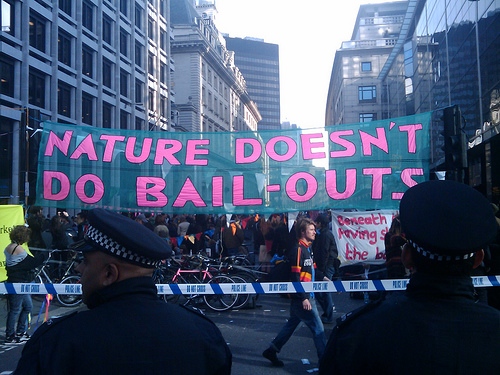 Photo: James Mitchell via FlickrAs we know, one of the few beneficial side effects of the Great Recession of 2009 was the decline in global greenhouse gas emissions as our consumer-centric economy sputtered. But that also sent the voluntary carbon markets into a tailspin, according to a new report released Tuesday by Bloomberg New Energy Finance and Ecosystem Marketplace.
Photo: James Mitchell via FlickrAs we know, one of the few beneficial side effects of the Great Recession of 2009 was the decline in global greenhouse gas emissions as our consumer-centric economy sputtered. But that also sent the voluntary carbon markets into a tailspin, according to a new report released Tuesday by Bloomberg New Energy Finance and Ecosystem Marketplace.
Voluntary carbon markets, such as the Chicago Climate Exchange, allow companies to trade carbon credits, usually as part of corporate sustainability programs where they pledge to neutralize greenhouse gas emissions by buying offsets tied to forestry programs, the capture of methane gas from landfills, and other efforts. (Such markets should not be confused with mandatory, regulated markets such as the European Trading Scheme.)
The value of greenhouse gas emissions credits traded on the voluntary markets plunged 47 percent in 2009 to $387.4 million, while the volume of greenhouse gas emissions traded fell 26 percent to 93.7 millions of tons of carbon dioxide equivalent (MtCO2e).
“The economic recession had a marked impact on the number of companies offsetting greenhouse gas (GHG) emissions,” wrote the report’s authors, who compiled data provided by more than 200 carbon credit suppliers and the carbon exchanges. “In response to the global financial crisis, companies cut back on discretionary funding for corporate social responsibility initiatives, including offsetting emissions. At the same time, the prospects for new compliance demand remained uncertain.”
Still, even in a recession the volume of greenhouse gas emissions traded in 2009 was 39 percent higher than in 2007.
Interestingly, the regulated carbon markets powered through the downturn, growing 7 percent with 8,625 MtCO2e traded at a value of $144 billion, according to the report.
The United States became the world’s biggest supplier of voluntary carbon credits for the first time last year, followed by Latin America and Asia.
Methane-related projects accounted for 41 percent of offset credits while forestry programs were tied to 24 percent of credits and renewable energy to 17 percent.
“Survey respondents were highly positive about the prospects for the global voluntary markets and collectively believe transactions will increase to approximately 400 MtCO2e in 2012, 800 MtCO2e in 2015, and 1,200 MtCO2e in 2020,” the report concluded. “Whether this growth will actually be achieved remains to be seen; it does demonstrate a strong sense of optimism for future activity in the voluntary marketplace.”


